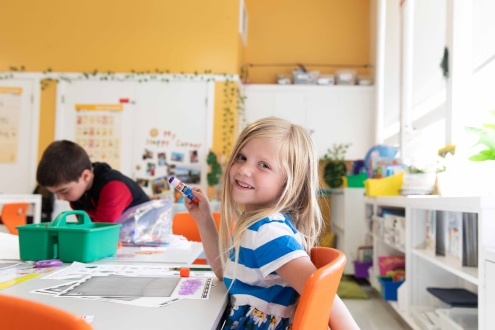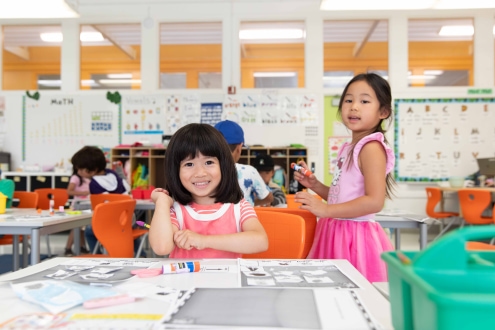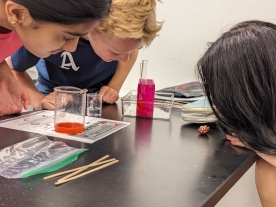test
Lower School: Early Childhood
Lower School: Early Childhood (TK-K)
Where Imagination Meets Growth
At Khan Lab School, our Lower School Transitional Kindergarten and Kindergarten learners develop essential skills through joyful exploration, purposeful play, and meaningful interactions. Young children naturally build critical abilities in these formative years – from social-emotional awareness and collaborative problem-solving to early literacy and mathematical thinking. Our nurturing environment encourages children to ask questions, take thoughtful risks, and develop independence while building the fundamental skills that will serve as building blocks for all future learning.
What does mastery-based learning look like for our youngest students?
Imagine a learning environment where your child never has to rush past concepts they haven't fully grasped, or wait when they're ready to surge ahead.
Mastery-based learning means every young student moves forward at their own pace, thoroughly understanding each concept before taking on new challenges—just as they learned to walk,
talk, and explore their world naturally.
In our early childhood program, this translates to children engaging with activities and concepts until they demonstrate genuine understanding, whether they're
learning letter sounds, counting objects, or developing essential social skills. This approach builds confident learners who develop deep understanding rather than simply memorizing facts,
creating a solid foundation for all future learning.
At Khan Lab School, we bring mastery-based learning to life through:
- Personalized Progression: Students advance through learning objectives at their ideal pace, experiencing meaningful challenges through diverse teaching approaches—from small group collaboration to one-on-one guidance, directed instruction to hands-on discovery.
- Smart Technology Integration: We thoughtfully incorporate learning technologies to create customized learning experiences that respond to each child's needs.
- Multiple Paths to Understanding: Children demonstrate their knowledge in ways that match their learning approach, whether through writing, artistic expression, project work, or verbal communication.
- Mixed-Age Learning Communities: Younger students find inspiration and guidance from older peers while developing vital social and emotional skills through natural mentorship opportunities.
We prioritize student agency by focusing on mastery rather than traditional grades. Our learner-centric approach encourages students to work alongside their teachers to:
- Identify areas for growth
- Celebrate achievements
- Discover new learning opportunities
- Set personalized learning goals
The earliest
years of a child's education lay the foundation for a lifetime of curiosity and learning.
DISCOVER MORE
TK-1 Curriculum
Grades 2-5 Curriculum
The Early Childhood Learning Experience
At Khan Lab School, we create a warm and welcoming bridge between home and classroom, where every child's journey begins with confidence. Our thoughtfully designed spaces spark natural curiosity, inviting young learners to explore and discover through hands-on experiences.
We believe learning is most meaningful when it flows across subjects. Our approach weaves together art, science, literature, and math in ways that mirror how children naturally experience the world. Students might explore patterns in nature through both mathematical concepts and artistic expression, or investigate science concepts through storytelling and experiments.
This interconnected style of learning doesn't just make education more engaging—it helps students develop the creative thinking and adaptable mindset they'll need throughout their
academic journey and beyond. Here, every question leads to new discoveries, and every discovery fuels the joy of learning.
Our classrooms are intentionally designed to foster both independence and collaboration featuring:
- Diverse hands-on materials and activities, carefully selected to support various developmental areas
- Flexible spaces that adapt to different learning modes—from individual work to group projects
- Thoughtful technology integration that enhances student learning
- Strong connections to nature through neighborhood walks and field trips
Our program also emphasizes a child's place in the natural world through:
- Daily outdoor exploration and play (2-3 hours per day)
- Hands-on gardening projects that teach patience, responsibility, and scientific concepts
- Regular engagement with the natural world beyond our classroom walls
Early
Childhood
Curriculum
Science
In our science classes, students explore life science, earth science, and engineering and design through small group discussions and projects. This approach not only enhances their
understanding of the subjects but also develops their social, problem-solving, critical thinking, and communication skills. For example, students might study how animals camouflage
themselves, discuss these strategies with peers, and then work on a project to create their own animals that can blend into different environments.
Mathematics
We use differentiated math groups to provide each student with the support they need to learn and grow. By incorporating math into outdoor activities, such as using objects from nature for
counting and creating expressions, we make math interactive and engaging while ensuring students build fundamental skills. Depending on their level of mastery, TK and Kindergarteners may be
in a mixed-age math group with first graders.
Visual Arts
The art curriculum fosters artistic literacy and nurtures children's curiosity and creativity. Students are encouraged to express their unique perspectives while learning to see and
think like artists. The Kindergarten curriculum builds fundamental skills such as cutting, tearing paper, using paints and brushes, coloring with various materials, and modeling 3D objects.
Students also explore the elements of design—line, shape, color, texture, pattern, and form—and learn to use art vocabulary to discuss their own work and that of other artists.
Physical Education
Students grow their motor skills and teamwork through fun games and sports. They learn the fundamentals of throwing and catching, running and jumping, then apply those skills in sports such as volleyball, basketball, soccer, and dance.

Computer Science
Beginning in first grade, our computer science program develops digital literacy and computational thinking skills. Students learn about computer systems, programming concepts, and digital
citizenship. The curriculum emphasizes both technical skills and responsible technology use, preparing students for an increasingly digital world.
.
Language Arts
In TK and Kindergarten, students develop communication and English language skills that lay the foundation for mastering content across all subjects. Our fluency groups focus on guided reading, phonics, spelling patterns, sight word practice, and one-on-one reading with a teacher, supported by the Handwriting Without Tears curriculum. We also use the EL Education curriculum, which helps students become successful readers, writers, and communicators by integrating reading and writing skills with subjects like science, history, art, and geography. Students also participate in our reading buddies program with 3rd graders.
Advisory/Social Emotional Learning
Students spend time growing their self-awareness, learning to identify and manage their emotions and building interpersonal relationship skills. Social-emotional learning (SEL) is integrated throughout the day, including circle time and daily activities. Students learn to recognize and respond to their emotions, using puppets and role play to help them practice appropriate behavior and discuss their feelings. Our goal is to foster empathy and a strong sense of community by promoting respect for diverse opinions and cultures. By teaching inclusivity and encouraging a sense of belonging, we create an environment where individuality can thrive and everyone can contribute to the common good.
Frequently Asked Questions
What does a typical day look like?
Our day maintains a rhythm of active and calm activities, balancing group and individual experiences. The schedule is flexible and may be adjusted based on children's needs and weather conditions. Each day combines structured learning activities with flexible exploration time. Students might start with a morning gathering, then move through various learning experiences at their own pace. They could spend time practicing writing in small groups, exploring math concepts through hands-on materials, or working on independent projects.
A Sample Day in TK and Kindergarten
8:30 Student Arrival/Outdoor Playtime
9:00 Morning Advisory
9:20 English Language Arts
Morning Snack & Recess
10:20 Music, Science or Outer Wellness
Break
11:20 Free Choice, Art or Share My Work
Lunch and Recess
12:45 Math Group
1:45 Independent Project Time
Afternoon Recess
2:45 Reading
3:30 Extended Day Program (Optional)
What is student agency and why is it important?
Student agency means giving children an active role in their learning journey. When children have agency, they develop crucial life skills like decision-making, time management, and self-awareness. This foundation of independence builds confidence and creates lifelong learners who take ownership of their education.
How do you balance structure with student choice?
We create a carefully designed framework that offers meaningful choices while maintaining clear expectations. This approach helps children develop decision-making skills without feeling overwhelmed by too many options.
What are the age requirements for TK and Kindergarten?
For Transitional Kindergarten (TK), children must be 4 years old by June 1st of the year they enter. For Kindergarten, children must be 5 years old by September 1st.
How do you know if my child is really learning without traditional grades?
Rather than using traditional grades, we track your child's progress through clear learning milestones and authentic demonstrations of understanding. For example, we observe how a child applies number concepts during play, their ability to retell stories in sequence, or how they solve social challenges with peers. Our teachers document these moments and share detailed progress updates, giving you a much richer picture of your child's growth than a simple letter grade could provide.



